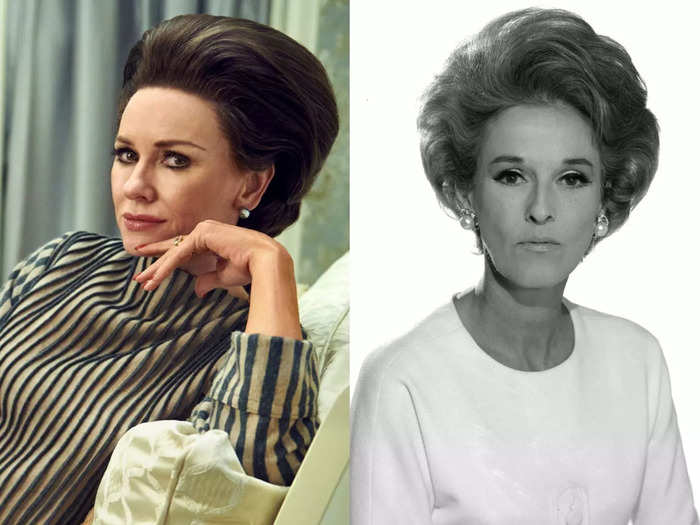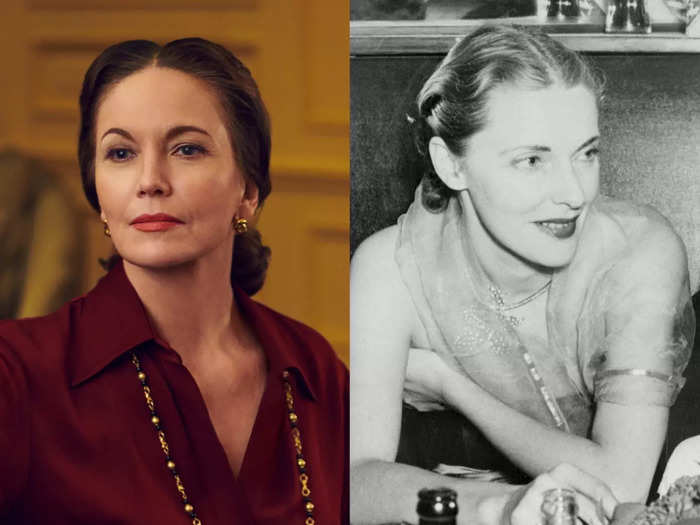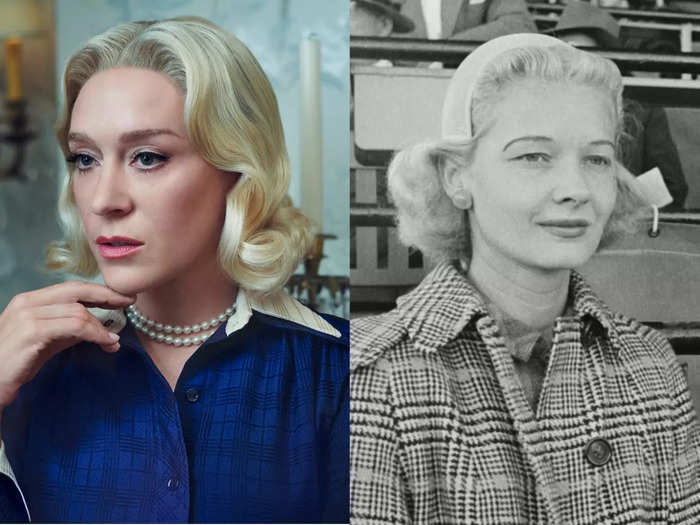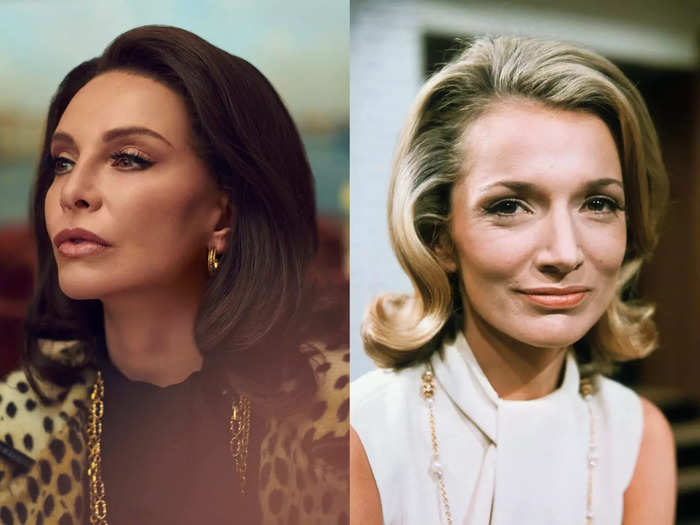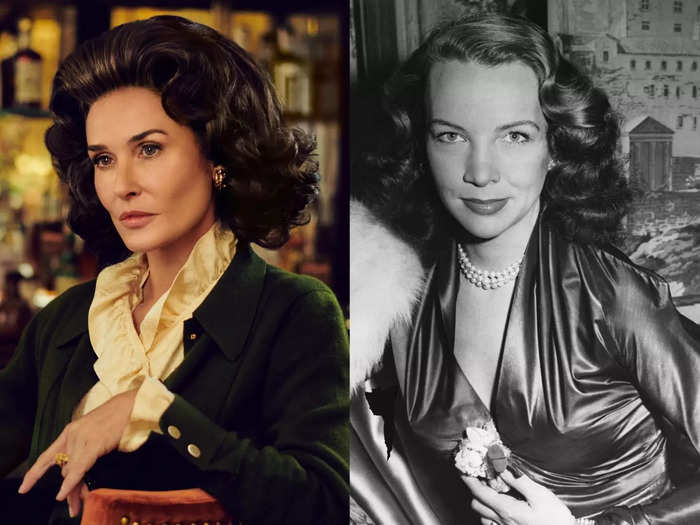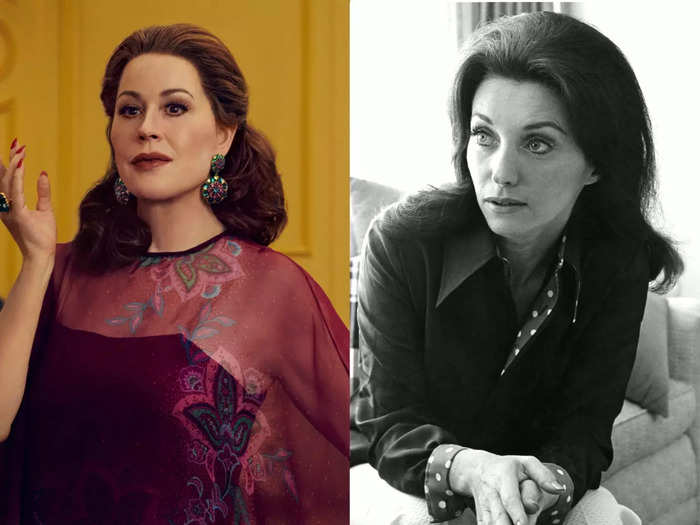Tom Hollander (left) portrays Truman Capote in "Feud: Capote vs. The Swans," who is pictured (right) with socialite Lee Radziwill.FX, Fairchild Archive/Penske Media via Getty Images
- The second season of "Feud" focuses on Truman Capote and a group of socialites he called his swans.
- Babe Paley, Slim Keith, C.Z. Guest, and Lee Radziwill were among those who confided in the author.
"Feud: Capote vs. The Swans," the second season of Ryan Murphy's anthology series, dramatizes the fallout between author Truman Capote and some of New York's most legendary socialites, whom he referred to in his final, unfinished novel as "swans."
As audiences learn in the first episode of the series, which aired Wednesday, Capote (Tom Hollander) sees these beautiful, wealthy women as swans because they glide through society in a way that appears effortless to the rest of the world.
However, if you glimpse below the surface, you would see that the swans have to paddle faster than everyone else just to stay afloat. If they don't, they'll drown underneath the heavy weight of their plumage.
In real life as in the show, Capote was a trusted confidanté to these women and learned about all the ways they were struggling: marital issues, infidelity, substance abuse, and sexual assault, among them.
When he betrayed this trust by writing a searing commentary that included thinly veiled portraits of many of these women for an Esquire story titled "La Côte Basque 1965," everything changed.
After the short story (which was supposed to be an excerpt of his forthcoming magnum opus "Answered Prayers") was published in 1975, Capote was cast out of their inner circle and, in many cases, was never allowed back in.
Here's everything you need to know about Capote's swans featured in "Feud" — and the ones that didn't make his inner circle but still had their secrets exposed in his work.
Babe Paley
Naomi Watts as Babe Paley in "Feud: Capote vs. The Swans"; Barbara "Babe" Paley in 1967. FX, CBS via Getty Images
"Babe Paley had only one fault: she was perfect. Otherwise, she was perfect," Capote once remarked of the woman said to have been his favorite swan, according to Tatler.
Paley (portrayed by Naomi Watts in "Feud: Capote vs. The Swans") was one of New York's most famous socialites. Born to a famed neurosurgeon, she made her debut as a debutante in 1934, and four years later, Paley, then known by her maiden name, Barbara Cushing, began working as a fashion editor at Vogue magazine, according to an obituary in The New York Times.
She left Vogue and became a full-time socialite in 1948 but was still widely known for her impeccable style. She was inducted into the International Best Dressed List Hall of Fame in 1958 after becoming a permanent fixture on the world's best‐dressed women list.
She was married twice. Her first husband was advertising executive and oil heir Stanley Mortimer, with whom she had two children; her second was CBS founder William Paley, with whom she welcomed two more.
Capote's "La Côte Basque, 1965" alluded to Paley and her husband's martial issues stemming from his infidelities in the characters Cleo Dillon and her philandering husband, Sidney Dillon. According to BBC, after the magazine hit newsstands, Paley never spoke to Capote again. She died at the age of 63 from lung cancer in 1978.
Slim Keith
Diane Lane as Slim Keith in "Feud: Capote vs. The Swans"; Nancy "Slim" Keith, circa 1949. FX, Bettmann/Getty Images
According to Women's Wear Daily, Nancy Keith (portrayed by Diane Lane), who graced the cover of Harper's Bazaar at 22, didn't get her nickname "Slim" from her self-confessed "tall, skinny frame" but because of a chance encounter the California native had with actor William Powell.
While vacationing in Death Valley, Powell spotted Keith diving into a pool and christened Keith with the moniker that would follow her for the rest of her life, so the story goes. After striking up a friendship, Powell introduced Keith to his Hollywood friends, including "Scarface" director Howard Hawks, who was so smitten with her that he divorced his wife and begged Keith to marry him.
Keith's influence on Hawk and Hollywood can't be overstated; the filmmaker reportedly modeled several of his iconic femme fatales after Keith, and she was even responsible for the discovery of Lauren Bacall as she spotted her on the cover of a magazine and encouraged her then-husband to cast her.
Hawks wasn't the only man in Keith's life; she was also pursued romantically by Clark Gable and Ernest Hemingway, according to Vanity Fair. She remarried twice. Her second husband was American producer Leland Hayward, and her third was the British banker and aristocrat Kenneth Keith, Baron Keith of Castleacre, which made her Lady Keith of Castleacre.
It's widely believed that the fictional Lady Ina Coolbirth in "La Côte Basque, 1965" was a thinly veiled portrait of Keith, bolstered by the fact that the real Keith was the only one of Capote's so-called swans with a title. She died at 72 in 1990, having never spoken to the author again.
C.Z. Guest
Chloë Sevigny as C.Z. Guest in "Feud: Capote vs. The Swans; C.Z. Guest, circa 1953. FX, Slim Aarons/Hulton Archive/Getty Images
As Capote states in the first episode of "Feud: Capote vs. The Swans," Lucy Douglas "C.Z." Guest (played by Chloë Sevigny) was a master horticulturist who could stretch marigold season into autumn. But that wasn't her only notable talent. Guest was also a skilled horsewoman, actor, and columnist.
She was also a muse to several fashion designers and artists, including Diego Rivera, Salvador Dalí, Ralph Lauren, and Andy Warhol.
She was married to polo champion Winston Frederick Churchill Guest, a distant cousin of the British Prime Minister, until his death in 1972 and never remarried.
According to an obituary from the Observer-Reporter, Guest's distinctive nickname, "C.Z." was adapted from "Sissy," a name her siblings would often call her when they were young.
Guest, who died in 2003 at 83, was one of the few who didn't shun Capote after he wrote "La Côte Basque," likely because she wasn't easily identifiable in the text.
Lee Radziwill
Calista Flockhart as Lee Radziwill in "Feud: Capote vs. The Swans"; Lee Radziwill circa 1968. FX, Bettmann/Getty Images
Lee Radziwill was one of Capote's most well-connected swans as the younger sister of Jacqueline Onassis and sister-in-law of President John F. Kennedy. But even before her sibling's marriage, she was a person of note, having been born into a socially established family.
Her coming-out party in 1950 was documented in Life magazine, according to Town & Country. In the years that followed, Raziwill attempted to break into the movie business but was unsuccessful.
According to Gerald Clarke's biography of Capote, even before Capote's Esquire piece was published, Radziwill's relationship with the author was strained as he had pushed for her to star in a television adaptation of the 1944 movie "Laura," which he had written. The project was not well received by critics, and Radziwill never acted again.
Radziwill married three times. Her first husband was Michael Temple Canfield, a publishing executive. Upon her second marriage to Polish aristocrat Stanisław Albrecht Radziwiłł, she became a princess, but in title only. Her third marriage, to movie director and choreographer Herbert Ross, ended in divorce.
Unlike the other women, Radziwill and her former First Lady sister are mentioned by name in Capote's Esquire story, rather than given an alias. After it was published, she continued her acquaintance with the "In Cold Blood" author, likely because, as BBC points out, the two main characters in the story conclude that she is more beautiful than her sister.
Radziwill died in 2019 at age 85.
Ann Woodward
Demi Moore as Ann Woodward in "Feud: Capote vs. The Swans"; Ann Woodward in 1955. Pari Dukovic/FX, Bettmann/Getty Images
Ann Woodward (Demi Moore) was not technically one of Capote's swans, but his pen did take aim at her in the Esquire story, creating a thinly veiled character named Ann Hopkins who, like Woodward, accidentally killed her husband in the middle of the night after mistaking him for an intruder.
In real life, Woodward, who entered into society from obscurity after marrying banking heir William Woodward Jr., was exonerated for her husband's death after testifying that there had been a string of break-ins in their Oyster Bay neighborhood and they had both gone to bed armed with weapons. Per her New York Times obituary, a man even pleaded guilty to attempted burglary of the Woodward estate on the night of the shooting.
However, the character in Capote's story — which was published 20 years after the shooting — "got away with cold-blooded murder" after deciding she would get more of her husband's estate as a widow than a divorcée.
Shortly before the issue of Esquire carrying the story hit newsstands, Woodward killed herself by ingesting a cyanide pill. There is no evidence that Woodward knew the excerpt would try to paint her as a murderous, gold-digging wife but it has been heavily speculated over the years that she had received an advance copy of the story.
Joanne Carson
Molly Ringwald as Joanne Carson in "Feud: Capote vs. The Swans"; Joanne Carson in 1972. FX, Michael Ochs Archives/Getty Images
Joanne Carson, the ex-wife of the "Tonight Show" host Johnny Carson, was also not officially one of Capote's swans but among those satirized in the piece.
Her thinly veiled counterpart was Jane Baxter, the wife of a "midnight-TV clown" who the two gossiping women say received a phone call from her husband while he was in bed with his mistress.
Despite having her laundry aired so publicly, she remained a loyal and longtime friend to Capote.
It's possible that she forgave Capote for his less-than-flattering portrait of her marriage because of the loyalty he had shown after her divorce from the TV legend in 1972.
"Everyone moved toward Johnny [after the divorce], because that was where the power was," Carson told the Los Angeles Times in 2006. "But Truman stood by me like a rock."
Per The Hollywood Reporter, the "Breakfast at Tiffany's" author kept a writing room at Carson's home in Bel Air, and it was there where he spent his final moments before he died in 1984, at the age of 59.
Carson died in 2015, aged 83.
"Feud: Capote vs. The Swans" airs Wednesdays at 10 p.m. ET on FX.

